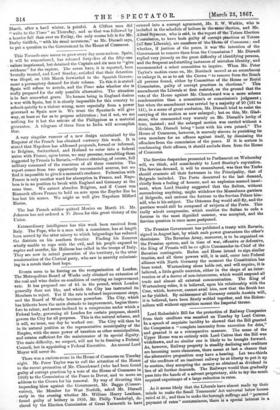There was a carious scene in the House of Commons
on Tuesday night. Mr. Peter Taylor was to call the attention of the Home to the recent promotion of Mr. Churchward (who had been found guilty of corrupt practices by a vote of the House of Commons in 1859) to the Commission of the Peace in Dover, and to move an address to the Crown for his removal. By way of diverting this impending blow against the Government, Mr. Bagge (Conser- vative), the Member for West Norfolk, asked Mr. Disraeli early in the evening whether Mr. William Henry Leatham, found guilty of bribery in 1859, Mr. Philip Vanderbyl, de- clared by the Election Commission of Great Yarmouth to have entered into a corrupt agreement, Mr. E. W. Watkin, who is included in the schedule of bribers in the same election, and Mr. Alfred Seymour, who is said, in the report of the Totnes Election Commission, to have been guilty of corrupt practices at Totnes (all'four Liberals), are members of the House of Commons ; and whether, if justices of the peace, it was the intention of the Government to remove them from the Commission? Mr. Disraeli replied very jocosely on the great difficulty of identifying persons, and the frequent and startling instances of mistaken identity, and recommended a select committee to inquire. When Mr. Peter Taylor's motion came on, Mr. Bentinck moved as an amendment to enlarge it, so as to ask the Crown "to remove from the Bench all persons found, either by Committee of the House or Royal Commission, guilty of corrupt practices in elections." This amendment the Liberals at first resisted, on the ground that the vote of the House against Mr. Churchward was a more solemn condemnation than a committee's or commission's judgment ; but when the amendment was carried by a majority of 20 (161 to 141), in a scene of great confusion, Mr. Disraeli tried to resist the carrying of the motion as now enlarged ; but on this, Mr. Glad- stone, who commented very warmly on Mr. Disraeli's levity of tone, insisted ; and the enlarged motion was carried without a division, Mr. Disraeli being " hoist with his own petard." The House of Commons, however, is scarcely sincere in punishing its own members for an offence against itself, by dismissing the offenders from the commission of the peace. If it is serious in condemning their offence, it should exclude them from the House of Commons.






























 Previous page
Previous page